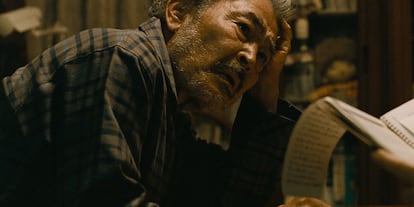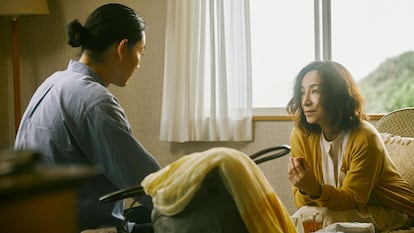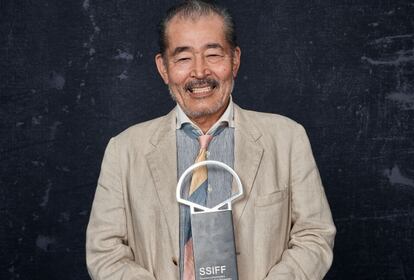Japanese movies tell heartfelt stories about the ravages of dementia and age
The Asian nation’s graying population is center stage in films like ‘Plan 75,’ ‘A Hundred Flowers’ and ‘Great Absence,’ for which octogenarian Tatsuya Fuji won the Best Actor award at the 2023 San Sebastián Film Festival


At the age of 82, Tatsuya Fuji gracefully accepted the Best Actor award at the 2023 San Sebastián International Film Festival for his outstanding performance in Great Absence. The award not only highlighted the brilliance of a veteran actor known for In the Realm of the Senses (1976), but also shed light on how Japanese cinema is addressing the challenges of the nation’s aging population. Japanese films like A Hundred Flowers examined Alzheimer’s disease, while Plan 75 explored the challenges of caring for the elderly in a unique blend of social drama and science fiction. In the movie, a futuristic Japanese government offers a controversial solution to the aging problem — death by lethal injection at age 75 in exchange for a generous financial incentive.
These films showcase different aspects of a demographic reality: over 10% of Japan’s population is at least 80 years old, and 29.1% of the total population (125 million) is 65 or older. To supplement their social security income, many people keep working after reaching retirement age (65), and currently represent over 13% of the active workforce. It’s no surprise that Japanese films — mystery, action, comedy, and sci-fi — are now exploring the challenges of a graying society facing issues like financial security, long-term care and quality of life.

In Plan 75, director Chie Hayakawa tells a story about a dystopian Japan in the near future with a plan to ease its crushing pension burden: the government offers a financial incentive for people over 75 to voluntarily die by lethal injection. The film, which premiered at the 2022 Cannes Film Festival, was inspired by real life events — the tragic 2016 murders of 19 mentally disabled people, some of them elderly. The individual responsible for these shocking murders is a former nurse who had shown a disturbing willingness to end the lives of 460 individuals suffering from mental illness “for the benefit of Japan and world peace.”
It’s a recurring theme in the cultural tradition of Japan. In 1956, Shichiro Fukazawa wrote a short novel called The Ballad of Narayama, inspired by the Japanese practice of ubasute (abandonment of old women). The word appears in Buddhist poetry, and ubasute was occasionally carried out during times of great scarcity in Japan. Three film adaptations of Fukazawa’s novel have been made, and the 1983 version directed by Shohei Imamura won the Palme d’Or that year at the Cannes Film Festival. The protagonist, Orin, is a 69-year-old woman who is active and in good health. But in her town, women over 70 are taken by their firstborn sons to Narayama Mountain to await death. Despite her son’s grief, Orin embraces her duty.
In 2022, Genki Kawamura won the Best Director award for A Hundred Flowers at San Sebastián. Kawamura had written a novel about his personal experience with Alzheimer’s — his grandmother started battling this disease in 2015. Kawamura said he wanted to write the book so “he wouldn’t forget his feelings of guilt.” When his grandmother passed away, Kawamura realized that a movie of the book would “more closely represent her perspective,” since she experienced her world “through images” in her final years. In his acceptance speech at San Sebastián, Kawamura said, “As she gazed upon the flowers, memories from her childhood and wedding day flooded back. It reminded her that she chose to leave her children for another man. Regret consumed her, but she could never find the words to speak to them. She never forgot that pain.” To bring that complexity to life, he cast actress Mieko Harada, a legendary figure in Japan who worked with director Akira Kurosawa in Ran and Dreams.

Alzheimer’s doesn’t make an appearance in Great Absence, but the equally cruel senile dementia does. Inspired by director Kei Chika-ura’s real-life experiences, the film tells the story of an actor living in Tokyo who is forced to travel home when the police call to say his father is suffering from dementia and has lost touch with reality. Making matters worse, his father’s second wife appears to be missing. The thriller’s non-linear narrative thoroughly immerses viewers in the son’s confusion as he tries to reconstruct his father’s memory while trying to solve the mysterious disappearance of his stepmother. Tatsuya Fuji plays the role of the father, a retired professor who tries to reconcile with his son while dementia erases his memories. “I didn’t have to do much preparation for the role because at my age, I tend to forget things and it’s just natural that my body has experienced dementia,” joked Fuji.
This is Fuji’s third collaboration with Chika-ura. At San Sebastián, Fuji hailed him as one of the great contemporary Japanese directors, and thanked the movie’s entire team profusely in his acceptance speech. Fuji also shared that he had the privilege of filming in Chika-ura’s real family home. Chika-ura’s father, like his movie counterpart, was a university professor who once got picked up by the police after wandering off one day. “Seeing the books he read and the things he had on his table, they were such a great source of inspiration!”

Fuji’s 60-year film career reached a turning point in 1976 with Nagisha Oshima’s In the Realm of the Senses. The first non-pornographic Japanese film to feature frontal nudity and explicit sexuality, the controversial movie was censored in several countries. Oshima, who was a prominent television actor at the time, joined forces again with Fuji in Empire of Passion (1978), another story with erotic themes that faced less censorship. The film was entered into the 1978 Cannes Film Festival, where Oshima won the award for Best Director. After the festival, Fuji fondly remembers renting a Renault 5 and taking a solo trip to Barcelona with one goal in mind: tasting the famous Spanish omelets touted by Ernest Hemingway.
Fuji’s collaborations with Oshima launched his film career, leading him to portray a wide range of characters in nearly 100 movies. From dashing tough guys to executives, yakuza gangsters, police officers, soldiers and talented craftsmen, Fuji’s versatility shines through. Director Takeshi Kitano surprisingly cast a 74-year-old Fuji in Ryuzo and the Seven Henchmen (2015), to play the lead role of a retired yakuza boss who gets his septuagenarian gang back together to bring down some con artists who are scamming the elderly. In that movie, the old people win.
Sign up for our weekly newsletter to get more English-language news coverage from EL PAÍS USA Edition
Tu suscripción se está usando en otro dispositivo
¿Quieres añadir otro usuario a tu suscripción?
Si continúas leyendo en este dispositivo, no se podrá leer en el otro.
FlechaTu suscripción se está usando en otro dispositivo y solo puedes acceder a EL PAÍS desde un dispositivo a la vez.
Si quieres compartir tu cuenta, cambia tu suscripción a la modalidad Premium, así podrás añadir otro usuario. Cada uno accederá con su propia cuenta de email, lo que os permitirá personalizar vuestra experiencia en EL PAÍS.
¿Tienes una suscripción de empresa? Accede aquí para contratar más cuentas.
En el caso de no saber quién está usando tu cuenta, te recomendamos cambiar tu contraseña aquí.
Si decides continuar compartiendo tu cuenta, este mensaje se mostrará en tu dispositivo y en el de la otra persona que está usando tu cuenta de forma indefinida, afectando a tu experiencia de lectura. Puedes consultar aquí los términos y condiciones de la suscripción digital.








































